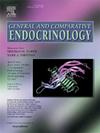胆囊收缩素和胃泌素释放肽抑制虹鳟鱼食欲的差异。
IF 1.7
3区 医学
Q3 ENDOCRINOLOGY & METABOLISM
引用次数: 0
摘要
鱼的食欲是一个多方面的现象,包括大脑和外周信号之间的特殊相互作用,因此,食欲要么受到刺激,要么受到抑制。胆囊收缩素(Cck)和胃泌素释放肽(Grp)是鱼类餐后释放的两种影响采食量的胃肠肽激素。由于激素的刺激或抑制作用可以在持续时间和强度上变化,使得激素效应的本质是动态的,我们使用直接的、无压力的方法模拟了Cck和Grp的动态。通过腹腔内插管对鱼进行激素治疗,注射后使用自动喂食系统监测采食量12 h。Cck和Grp以剂量依赖的方式降低采食量,在幅度和持续时间上都是激素特异性的。Cck对采食量的直接抑制作用持续2 ~ 3 h,而Grp对采食量的直接抑制作用持续整个12 h。数据表明,在虹鳟鱼中,Cck是一种短期的饱腹感信号,而Grp是一种长期的食欲抑制剂。本文章由计算机程序翻译,如有差异,请以英文原文为准。
Cholecystokinin and gastrin-releasing peptide differentially inhibit appetite of rainbow trout
The appetite in fish is a multifaceted phenomenon that comprises specialized interactions between brain and peripheral signals, and as a result, appetite is either stimulated or inhibited. Cholecystokinin (Cck) and gastrin-releasing peptide (Grp) are two postprandially released gastrointestinal peptide hormones that affect feed intake in fish. As the stimulatory or inhibitory effects of hormones can vary in duration and strength, making the nature of hormone effects dynamic, we modelled the dynamics of Cck and Grp using a direct, non-stressful approach. Fish were hormonally treated through an intraperitoneal cannula and feed intake was monitored for 12 h post-injection using a self-feeder system. Cck and Grp decreased feed intake in a dose-dependent manner, hormone-specific both in terms of magnitude and duration. Cck had an immediate inhibitory effect on feed intake, which lasted two–three hours, whereas the immediate inhibitory effect of Grp lasted for the entire 12-hour observation period. The data suggest that Cck acts as a short-term satiety signal in rainbow trout, while Grp acts as a longer-term appetite suppressor.
求助全文
通过发布文献求助,成功后即可免费获取论文全文。
去求助
来源期刊

General and comparative endocrinology
医学-内分泌学与代谢
CiteScore
5.60
自引率
7.40%
发文量
120
审稿时长
2 months
期刊介绍:
General and Comparative Endocrinology publishes articles concerned with the many complexities of vertebrate and invertebrate endocrine systems at the sub-molecular, molecular, cellular and organismal levels of analysis.
 求助内容:
求助内容: 应助结果提醒方式:
应助结果提醒方式:


